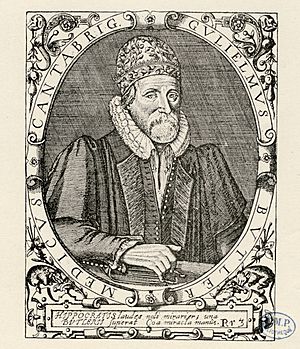William Butler (physician) facts for kids
William Butler (born 1535, died 29 January 1618) was a famous English doctor and a smart person who studied at Clare College, Cambridge. He was known for being a bit unusual and was considered "the greatest doctor of his time."
Contents
The Life of William Butler
Butler was born in Ipswich, Suffolk. He started studying at Peterhouse, Cambridge, in 1558. He earned his first degree in 1561 and a master's degree in 1564. In 1561, he became a Fellow at Peterhouse.
In 1572, he was chosen to be a Fellow at Clare Hall, Cambridge (which is now Clare College). The university also gave him a special permission to work as a doctor.
Butler's Unique Habits
According to a writer from the 1600s, John Aubrey, Butler lived in a shop in Cambridge. He had a helper, an "old maid" named Nell. Her job was to bring him home every night from a local gathering place.
How Butler Became Famous
Aubrey says that Butler first became well-known in 1603. This happened when he helped a local religious leader who was in a deep sleep. The leader had taken too much of a certain plant extract. Butler used a very unusual method to wake him up. He had a cow brought in and placed the sleeping person inside the warm belly of the cow. This strange treatment worked!
Butler as a Royal Doctor
Even though he didn't have a medical degree, King James VI and I chose Butler to be a doctor for the royal family. He even cared for the King's oldest son, Henry Frederick, Prince of Wales, when he became very sick in November 1612.
People believed Butler was an "empiric" doctor. This means he based his treatments on what he observed and learned from experience, not just on old theories. He did not agree with common practices like removing blood from patients. He also did not like the new and sometimes dangerous chemical medicines used back then.
Butler's Medical Advice by Letter
Some of Butler's old papers are kept at Clare College. These papers show that he sometimes gave medical advice through letters. One letter starts by talking about King Henry VIII. It describes him as a "vast and Rumbleduste Gyaunte" who was better with a "Butcher’s axe" than a "secretary’s pen."
Another letter humorously talks about a patient's habits. It uses made-up town names like "potton & Reelingworthe" and "tipplestall Grannge" to describe a path to "staggerington" and "downfall in the vale." This shows his playful and unique way of communicating.
Dr Butler's Purging Ale
Butler is also known for creating a special medicinal drink called Dr Butler’s purging ale. This drink was very popular in England during the 1600s.
Shortly before he passed away, Butler gave £26 to Clare College. This money was used to buy "finest gold," which was then made into a special cup called a chalice and a plate called a paten. These items are used in religious ceremonies.
Butler's Death and Legacy
A picture of Butler from 1620 says he died in 1617 at the age of 83. The words written below the picture are a poem. It talks about how the Fates (who control destiny) and Charon (who takes souls to the underworld) were surprised. They wondered why people were not dying as often. They found out it was because of "skillfull Butler," who could "knit" people's lives back together. The poem suggests they had to kill him because he was so good at saving lives.
Butler is buried in the main church of Church of St Mary the Great, Cambridge, where there is a monument and a Latin plaque in his honor. There is also a pub sign in the City of London named "The Old Doctor Butler's Head" after him.
 | Sharif Bey |
 | Hale Woodruff |
 | Richmond Barthé |
 | Purvis Young |


